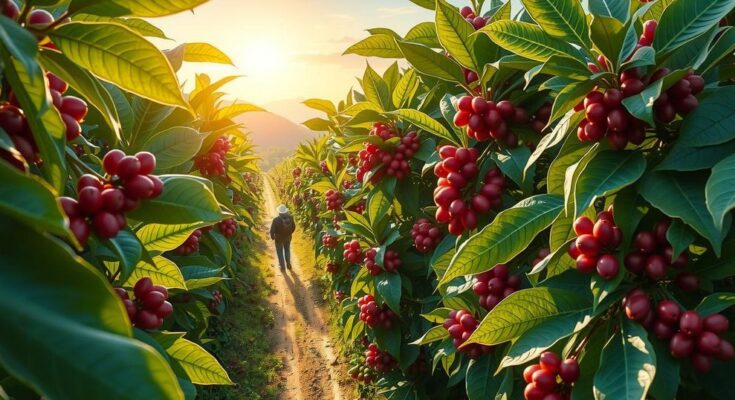This article examines the escalation of coffee prices in the U.S. attributed to climate change effects on Brazilian farms. As droughts and extreme temperatures diminish coffee yields, farmers struggle to meet rising global demand while facing increased theft and insecurity. The precarious situation highlights potential shifts in coffee cultivation as producers adapt to unprecedented challenges.
The rising cost of coffee, reaching approximately $7 per pound in American supermarkets, can be traced back to severe impacts on Brazil’s coffee farms caused by climate change. The region is facing extreme temperatures and prolonged droughts, exacerbating the challenges of global coffee production. Even as coffee demand grows, farmers like Augusto Rodrigues Alves are struggling with dwindling supplies, leading to a situation where coffee is becoming a luxury item rather than an everyday staple.
In regions such as Alta Mogiana, Brazilian farmers are witnessing drastic reductions in their harvests, with some crops shriveling by as much as two-thirds. This scarcity has resulted in criminal activities, including coffee theft, as farmers scramble to maintain their businesses. Tiago Donizete Rodrigues, another farmer, expressed the challenges of sourcing coffee from others to fulfill client demands due to his crop losses.
Brazil’s coffee culture is integral to its identity; coffee is not only a beverage but also a social ritual. However, the coffea arabica plant, which dominates global coffee consumption, is highly sensitive to temperature changes and requires specific growing conditions. Unfortunately, unusual climate patterns, including last year’s higher average temperatures, indicate that many regions in South America may become unsuitable for coffee cultivation due to climate change.
The potential decline of coffea arabica could revolutionize the coffee industry, pushing farmers towards more resilient species, such as the coffea canephora. Despite the current high prices, many farmers express uncertainty regarding their future in coffee production, as limited supplies hinder profitability.
Additionally, the rise in coffee prices has attracted criminal elements seeking to exploit these circumstances. Incidents of coffee theft have surged, with authorities reporting significant criminal operations raiding farms. Farmers in Alta Mogiana are developing new security measures, including hiring guards and using surveillance technology, to safeguard their remaining crops from increasingly organized theft.
In this climate, farmers like Rodrigues Alves find themselves in a precarious situation, holding onto only a small stock of coffee for personal security. The pressures from weather changes and criminal activities compel Brazilian coffee producers to navigate a challenging landscape while the global coffee hierarchy may soon be reshaped by these ongoing dynamics.
The surge in coffee prices can be fundamentally attributed to the impacts of climate change affecting Brazil, the world’s largest coffee producer. As extreme weather disrupts traditional farming practices, farmers face significant crop losses, leading to a rise in criminal activities targeting coffee supplies. The future of coffee production remains uncertain as farmers attempt to adapt to the changing environment and mitigate threats from theft, while global demand continues to rise. The coffee industry’s landscape may transform dramatically if current trends persist.
Original Source: www.bostonglobe.com




